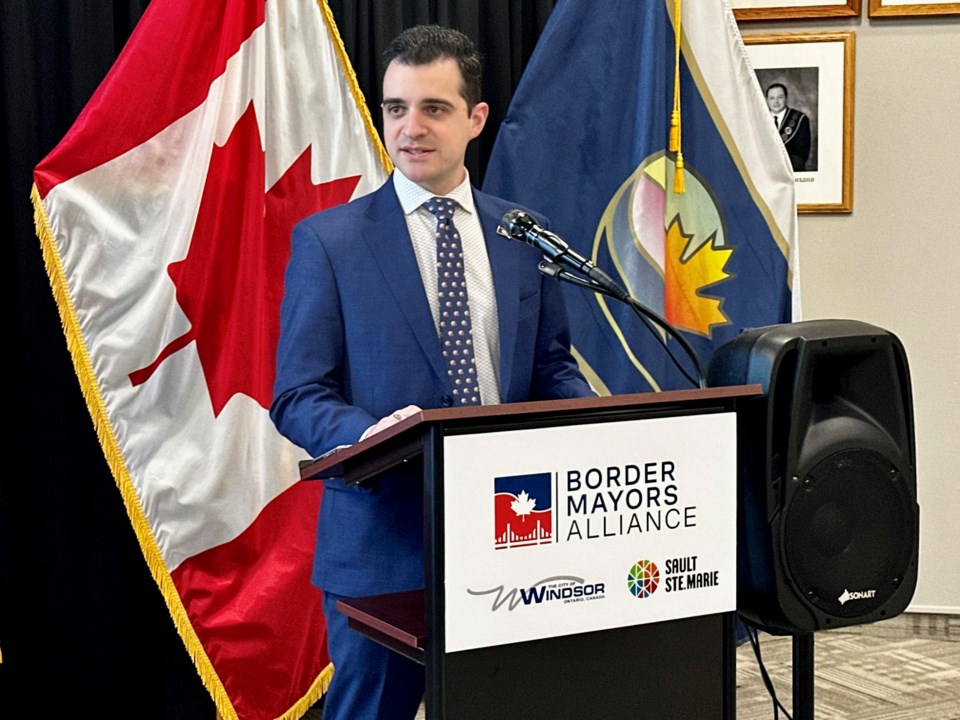As the U.S. government repeatedly threatens to slap tariffs on Canadian exports, a coalition of border mayors have come together to advocate for solutions that will safeguard one another’s communities and partnerships – on both sides of the border.
Chair of the Border Mayors Alliance, Windsor Mayor Drew Dilkens, visited Sault Ste. Marie on Thursday to meet with Mayor Matthew Shoemaker and local businesses that stand to be impacted by steel tariffs, like Algoma Steel and Tenaris.
Thirty-five Canadian border communities currently make up the alliance, and both mayors called to be part of the broader tariff conversation at the provincial and national level – as border cities stand to face an “immediate impact” should tariffs ultimately be put in place.
“The impact of reduced steel shipments down into the American Midwest, or further afield into the U.S., will represent not just an economic impact to Sault Ste. Marie, Ont., but if we have fewer bridge crossings for commercial traffic, if we have fewer trucks and trains going through the community than we have had historically, that's going to mean an immediate impact,” said Shoemaker.
With the possibility of 25 per cent tariffs on all Canadian exports, as well as a 25 per cent steel and aluminum tariff possible on steel and aluminum exports into the U.S. from any country, Shoemaker said navigating the shifting situation has “been a challenge.”
He called for the Border Mayors Alliance to be more closely involved in the tariff discussion.
“First we thought we had a 30 day reprieve, and then the next week there was an announcement that Canadian steel and aluminum tariffs would be imposed, right?” Shoemaker said.
“We are all working with our own government representatives at the provincial and federal levels to say 'include us in the conversation.'
Because of the uncertainty that this poses to our industry, to the labour force in our community and the economic well being of each of our communities – I think that there is work to do on that front to make sure we are as well versed in the potential response to tariffs as we could be.”
Just as Sault Ste. Marie in Ontario and Michigan have intertwined economies, Dilkens highlighted that Windsor’s Ambassador Bridge “carries about $390 million of goods back and forth each and every day.”
“The Gordie Howe bridge will open later this year and will quickly become the busiest commercial border crossing between our two countries,” he said.
“Seeing that bridge come together, seeing the link being built on both sides and meeting in the middle, it really speaks to that relationship that I think we forged with the United States for a long, long time, so we're going to keep working as border mayors.”
Dilkens similarly called to be part of the broader tariff conversation to make sure “that we are leveraging the relationships that we’ve developed,” and he pointed out that Michigan-based mayors he’s spoken with have also expressed concern about the impact of tariffs.
“It's been very reassuring to hear mayors in Michigan talk to me about the understanding they have about the negative consequences of a tariff applied to Canadian goods,” he said.
“How do we amplify their voices? How do we help them join the chorus of Canadians and others who are saying maybe this isn't a good idea?”
Shoemaker pointed out that tariffs imposed by the previous Trump administration in 2018 led to “tens of thousands” of job losses, as well as “increased production costs and higher prices for consumers” in both Canada and the U.S.
“The steel tariffs that are being proposed now will hurt workers, businesses and entire communities,” he said.
“The same will be true of any new tariffs on automobiles, lumber exports, energy exports, or broad based Canadian tariffs on Canadian consumables.”
Shoemaker said he would like to eventually see American communities join the alliance, and mentioned he has a “great working relationship” with his American Sault counterpart, Don Gerrie.
However, he said the tariff threat has put his cross border colleague in a “tricky situation.”
“I have trust in him. He has, I believe, trust in me, and there is a friendship there that we are committed to working together on for all issues and to mitigate any negative effects,” Shoemaker said.
“But I understand that he's in a politically challenging situation where his population overwhelmingly voted in support of President Trump, and he's not going to be able to speak in direct opposition to him.
“I think there are nuances to how we are going to have to tackle this issue, but that we've got a good friend and a good relationship with them, and we will work on it continuing forward," he added.
While the Trump administration’s initial tariff threats were raised, in part, due to fentanyl going into the U.S. – a minimal amount of which comes from Canada, Shoemaker pointed out – the mayor still supported measures that could stymie the drug’s flow into the community.
“The evidence that exists is that a fairly small portion of the cross-border fentanyl that is captured is captured at the Canadian border. Most of it comes from the Mexican border, but any amount is too much,” he said.
“I think that whatever measures can be taken to shore up the border, to make sure that even a small amount getting across the border is captured, should be taken.”
